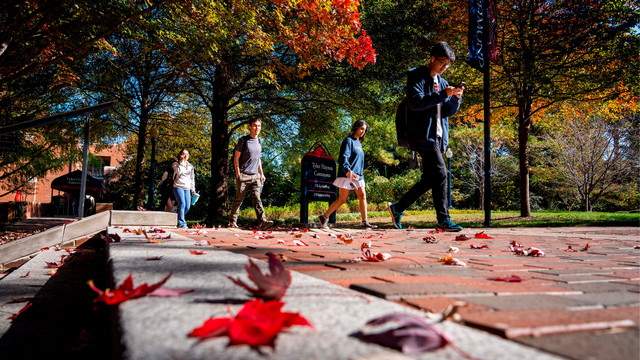Richmond professor works to preserve the beauty of autumn
RESEARCH & INNOVATION
Stephanie Spera is tracking the shifting seasons and how they influence the timing of the vibrant fall foliage.
When Stephanie Spera, an associate professor of geography, environment, & sustainability, observes the vivid colors of October, she struggles to simply enjoy what Henry David Thoreau calls the “month of painted leaves.” Whether she’s hiking Jesup Path in Maine’s Acadia National Park or apple picking with her family, she can’t help but think about what fall will look like in the future.
Spera is studying how climate change is reshaping this season and how communities can act to preserve it.
She found that in Maine, fall foliage has been delayed by almost a day each decade, mainly due to warmer summers. “Because it’s generally getting warmer, trees don’t have that environmental cue to start shutting down chlorophyll production,” Spera said. “They keep producing it later into the season than usual, which means leaves don’t change color because they need to wait for cooler temperatures to get that cue to stop producing green chlorophyll.”
But observing fall trends isn’t just about gathering data and conducting research for Spera — it’s about safeguarding a season that defines both landscapes and lives. From her students in Richmond to the maintenace of parks in Maine, she’s witnessing increased efforts to notice and make a difference.
Delayed reaction
Spera began focusing on climate modeling during her postdoctoral work at Dartmouth.
New England being her favorite place in the world, she studied how climate change was playing out at Acadia National Park, where fall colors seemed to be arriving later each year and becoming less predictable. This had a ripple effect on the region and the economy.
“Leaf peeping is a billion-dollar industry and fall is coming later than it used to,” Spera said. “I found myself wondering, what is happening to my favorite season?"
By 2019, Spera arrived at the University of Richmond and was soon awarded a fellowship to continue her research in Acadia National Park. She collaborated with her students to analyze satellite data and old newspapers, park records, and other archived data to figure out the timing of peak fall foliage along the East Coast from 1950 to the present.
“My students are the best part,” she said, specifically calling out the work of environmental studies and geography juniors Ryan Poulsen and Julia Norton, who worked on scaling up the research, as well as UR alum Olivia Hubert, an environmental studies major and 2019 graduate, who has gone through decades of archives on peak fall foliage.
“The spaces and landscapes we know and love are changing due to climate change, and it should be the goal of anyone who has a place that is special to them to be a good steward and try to preserve it for future generations,” Spera said. “I think we’re all noticing that the weather is different from what it used to be.”
Citing more intense droughts and rainfall, Spera said that trees are flowering earlier, and the timing of fall foliage is less predictable than it has been in the past.
Working toward hope and collective action
When asked if she has hope for the future, Spera smiled wryly and paused before answering. “More and more people are starting to see that collective action is important, and community is important. I do see progress being made, slowly.”
Hope also comes from the students Spera works with and the evolving understanding of the public toward climate change.
“We’ve done surveys, and 95% of people understand that climate change is something that is happening,” Spera said. “I also believe that things like protecting our national parks are truly bipartisan. We all love these spaces and want to preserve them.”
That love of beauty — specifically the splendor of fall — is evidenced in Spera’s work, which is making its way across mainstream media. Her research was recently highlighted in Time magazine, on the History channel, and in Popular Mechanics magazine. She also co-hosts the How We Got Here podcast, which features conversations with individuals who have discovered how to use their talents to combat climate change.

